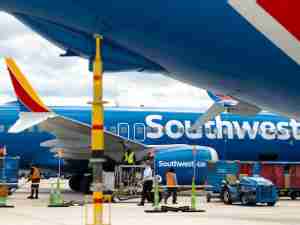After a 71-year run, Italy’s bankrupt Alitalia SpA may soon slide into the history books. Several international players are now looking to carve up the air travel market in Europe’s fourth-largest economy, with two Persian Gulf carriers leading the way.
Italian taxpayers have been pouring money into Alitalia for decades, but the bottom seemed to fall out when minority owner Etihad Airways PJSC capitulated to steep losses. Back in 2014, the Abu Dhabi-based carrier took a 49 percent stake in Alitalia with plans to slash costs and focus on longer international routes from Rome and Milan, the competitive turf where low-cost airlines such as easyJet and Ryanair had made fewer incursions.
That plan faltered and Alitalia floundered. Etihad, which has made a point of investing in ailing airlines, decided to end the pain and cut its ties. Alitalia’s subsequent bankruptcy was followed by 900 million euros ($1.2 billion) in government bridge loans to keep it aloft through later this year, but the prospect of additional assistance is uncertain given the political disarray tied to Italy’s recent elections.
Potential bidders are plotting various strategies for overhauling or dismantling the airline, salvaging the best bits of its network and fleet or seeking deep, permanent cuts. Alitalia’s bankruptcy administrators are working toward an April 30 deadline to assess offers. The company didn’t respond to an email seeking comment.
Sensing an opportunity, Qatar Airways last year acquired 49 percent of AQA Holding SpA, the newly formed parent of Italy’s second largest airline, Meridiana Fly SpA. Last month, the carrier changed its name to Air Italy and announced an international expansion and fleet renewal plan.
The airline, which began in the 1960s as Sardinia-based Alisarda, will begin flying to Bangkok, Miami, and New York this year in addition to its domestic routes, followed by additional international destinations in 2019. Next month, it will take delivery of the first of 20 Boeing Co. 737 Max it’s ordered, five Airbus A330-200s leased from Qatar and then as many as 30 Boeing 787-8s starting in May 2019. The airline’s goal is a 50-aircraft fleet by 2022 and 10 million annual passengers.
“If Alitalia goes away, most of what it’s flying will probably be back-filled by other airlines that can actually make money.”
Alitalia’s domestic network, meanwhile, is probably less valuable than its international routes, given the heavy schedules flown from and within Italy by Ryanair Holdings Plc and easyJet Plc. In terms of planned seat deployment, Italy represents Ryanair’s largest country in the 12 months ending July 2018, a projected 6 percent expansion, according to a scheduled capacity analysis of Diio Mi data published in Airline Weekly, a trade journal.
“If Alitalia goes away, most of what it’s flying will probably be back-filled by other airlines that can actually make money,” said Seth Kaplan, the publication’s managing partner. That was the experience in Hungary, where national carrier Malev Ltd. liquidated in 2012 after years of financial struggle. Now, Wizz Air Holdings Plc, easyJet, Deutsche Lufthansa AG and others dominate Hungarian skies.
Europe has seen other examples of 20th century flag carriers surviving for decades on state aid before finally succumbing to market forces. Belgium’s Sabena SA dissolved in 2001; Swissair went bankrupt the following year; Greece’s Olympic Airlines shut down in 2009; and Portugal sold its majority stake in national carrier TAP in 2015.
In the case of Alitalia, interested parties may include Lufthansa, which previously acquired parts of defunct carriers in Belgium, Austria and Switzerland; Air France-KLM Group, which used to own 25 percent of Alitalia; and private equity firm Cerberus Capital Management. Air France would like to keep Alitalia as part of the global SkyTeam alliance, which includes Grupo Aeromexico SAB and Delta Air Lines Inc., without buying an equity stake, Chief Financial Officer Frederic Cagey told Bloomberg TV last month. A SkyTeam spokeswoman declined to comment.
Cerberus had prepared a bid for the entire airline and was pitching its proposal as a plan to keep the carrier intact, the Financial Times reported in October, citing people familiar with the talks. A Cerberus spokesman declined to comment.
Delta and EasyJet have also been cited as potential bidders in Italian news reports about the process. Atlanta-based Delta is monitoring the bankruptcy but won’t comment on “industry rumor,” spokeswoman Olivia Cullis said. Delta President Glen Hauenstein was Alitalia’s chief commercial and operating officer from 2003 to 2005.









